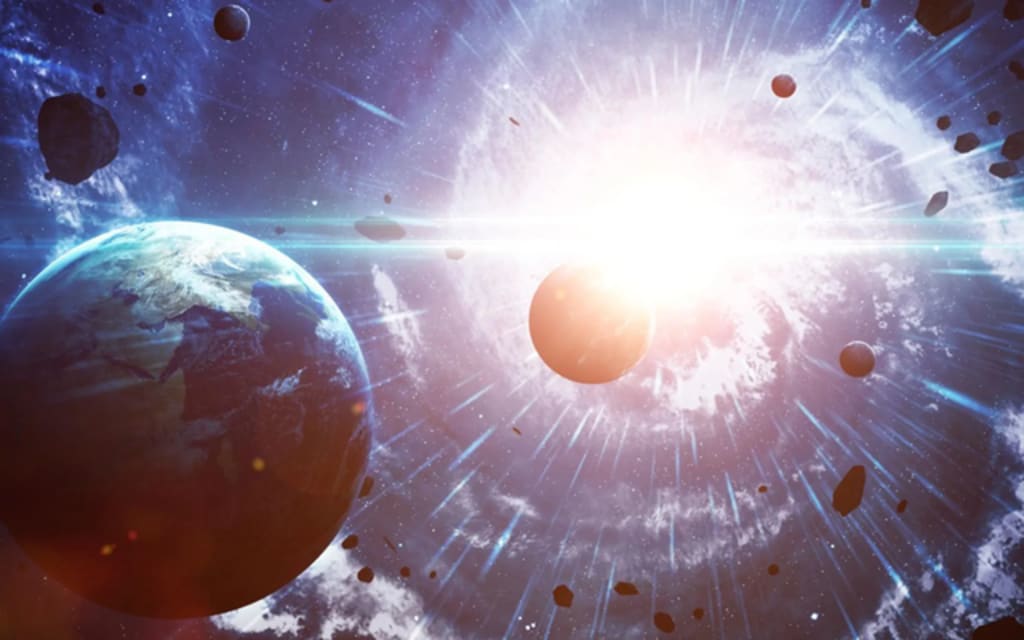The way the universe began is about to be rewritten
The universe is cycling

When it comes to the origin of the universe, we have to mention the Big Bang cosmology, which is arguably the most widespread theory today, and scientists have been able to give a lot of evidence to support it. But now this view may be rewritten because the Nobel Prize winner Penrose pointed out: that the universe is actually in a cycle.
What is the big bang theory of the universe?
In the 1920s, an astronomer discovered through a telescope that the world was shocked by the fact that the Milky Way was only one of the galaxies in the universe, and that the galaxies were moving away from each other.
This discovery has aroused the curiosity of many scientists. Since the universe is so big, how did it form?
On this point, the famous Belgian astronomer Georges Lemaitre believes that the reason why galaxies are moving away from each other is that the universe is expanding, specifically, that in the early days, the universe may have been very small, but it will slowly get bigger over time.
So based on this, scientists speculated that the present universe was formed from the explosion of a small ball, which is known as the Big Bang cosmology, and that the small ball is called a singularity, its density, mass, and temperature are extremes.
Subsequently, scientists combined the big bang cosmology of the speed of the big bang deduced the galaxy formation time in the galaxy, and finally came to the result - the singularity of the big bang time can be traced back to 13.7 billion years ago.
However, although the big bang theory is in the mainstream of the academic community, it does not mean that it is recognized by all scientists, several scientists have proposed many other ideas, and can also provide evidence to support their views.
For example, the universe was developed by a black hole, an amazing object that can use its power to swallow everything around it, causing it to remain in perpetual darkness, making it almost impossible for astronomers to observe its existence.
The scientists who came up with this idea were guided by the idea that the universe has always been cyclical, not simply formed from the explosion of a singularity, but that it existed before the singularity explosion.
Penrose's exploration of the universe
Few scientists support this new view, including the Nobel Prize winner Penrose. He believes that the universe has completed many cycles of death and rebirth, has experienced many big explosions, and will probably explode again shortly.
Penrose's exploration of the universe began in 2005 with the development of a "Conformal Cyclic Cosmology" using thermodynamics in physics and the geometric structure of space-time implied by the accelerating expansion of the universe.
This is Penrose's model of the universe based on Einstein's general theory of relativity, and he proposed the idea that the universe is always reincarnating and has no end.
Generally speaking, a Perpetuum is a billion years, it will change according to the changes in the mass and structure of the universe, and will continue infinitely in the beginning and end, whether in the past or the future it is eternal.
Therefore, the Big Bang that occurred 13.7 billion years ago can also be called the continuation of the universe "eternal" again, some people think this idea is too "crazy", but it is not the result of Penrose relying on imagination there is a basis for reality.
In the course of his scientific research, Penrose learned that the universe has six sky points, and named them "Hawking points" after his friend.
His astronomical research not only expanded the theory of relativity, but also included a lot of research on black holes, Penrose believes that the cosmic microwave with radiation hotspots may be formed under the role of evaporating black holes, and Hawking has also pointed out that black holes can leak cosmic radiation, but eventually will slowly evaporate.
But the evaporation process of black holes is relatively slow, and its evaporation process is not related to time in an absolute sense, so Hawking's point is the trace left by the universe from formation to decay, which is enough to show that the universe is indeed cyclic development.
Great contributions to science
Whether it is the big bang cosmology or the cosmic cycle theory, both have largely contributed to the development of science and can be called great contributions to science.
The reason why scientists explore the universe has always puzzled many people, after all, the universe today has gone through a long development process, not to mention understanding its past is a very difficult road.
The reason is very simple, tracing the past of the universe to understand the origin of the world, can help humans to form a deeper understanding of themselves, to promote the further development of human civilization, especially in the biological world we can not ignore an iron law: any living thing will die, even if it is human.
Not only in the twenty-first century, but also in ancient times, many ancestors started the journey of exploring the sun, moon, and stars, believing that any star has its unique meaning, so the field of astronomy has been developed since ancient times, and it has long been an integral part of the history of human development.
In a way, the development of human civilization and the progress of modern technology are partly due to the study of the universe, because almost all of the Earth's matter is inextricably linked to the universe, for example, the extinction of the dinosaurs in the Mesozoic era, possibly due to the impact of an asteroid impact.
The impact of changes in the universe on Earth cannot be ignored, so it is necessary to learn as much as possible about the past to create a better future.
There are many controversies about the origin of the universe from ancient times to the present, and the idea that the universe has always been in a cycle may still be difficult to confirm at this stage of technology.
After all, human beings are only a weak presence in the universe and can play a limited role, but one more step may become a huge support force for the road of human civilization, and any scientific research results have their inestimable value.
About the Creator
Karen Gillanah
The aggravation that can be told is not aggravation; the lover that can be snatched away is not a lover.






Comments
There are no comments for this story
Be the first to respond and start the conversation.